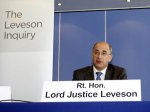 The biggest irony of yesterday’s publication of the report from the Leveson Inquiry into the standards, ethics and abuses of the UK press, is that in recent years our press in this country has been incredibly well-behaved.
The biggest irony of yesterday’s publication of the report from the Leveson Inquiry into the standards, ethics and abuses of the UK press, is that in recent years our press in this country has been incredibly well-behaved.
With Sir Brian’s Sword of Damocles hanging over their collective heads the press has, in effect, reformed itself.
I offer this as evidence. Firstly, not one single national newspaper published the photos of the Duchess of Cambridge topless on holiday. In fact only one newspaper, in what was a deliberate two fingers to Sir Brian, published the photos of Harry in Vegas.
Is this some Damascene Conversion to the right of privacy? Almost certainly not and one suspects that once the haggling over self-regulation “underpinned by statue” is out of the way, normal service will be resumed.
However, buried in Sir Brian’s mammoth publication is one recommendation which could have very far-reaching consequences for how our press behaves, namely the conscience clause in journalist employment contracts, which would allow individual journalists to opt out of working on any story which they believe to be unethical.
When I heard the Labour MP Tom Watson speak in Birmingham earlier this year, he offered the view that the abuses at the News of the World could never have happened if Wapping had been unionised and there had been a counterbalance to employer abuse of power.
There are many in the trade union movement who agree with him and it would seem that Leveson does too. Some of the most interesting sections of the report in fact, detail the culture of abuse and bullying at Wapping which fed the (alleged) criminal behaviour of journalists.
There are numerous positives that have come out of the Leveson Inquiry and its resulting report, but the conscience clause, and the increasing recognition of the positive effects that workplace unionisation can have in curbing employee abuse, could be Sir Brian’s most lasting legacy.








